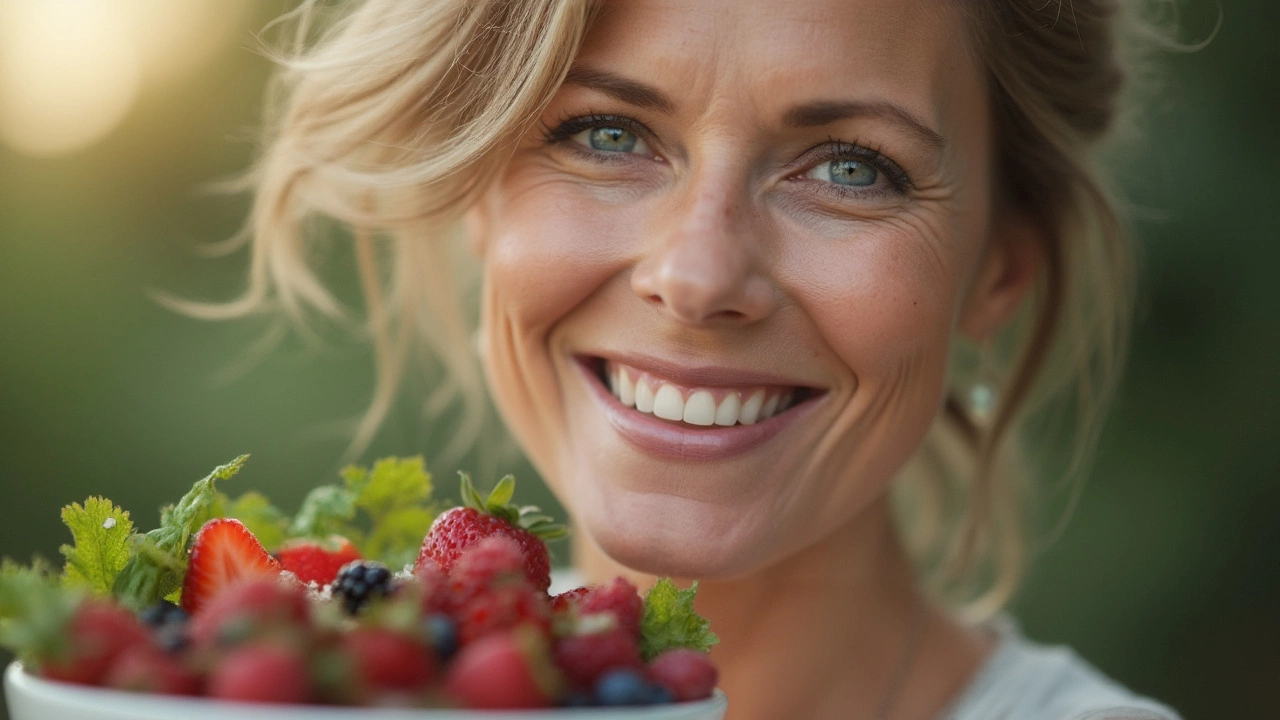It’s the kind of thing you notice at a party or while scrolling Insta: someone who’s pushing fifty, but their energy, skin, and smile scream decades younger. Ask around, and more often than not, you'll find there’s a common thread tying these folks together—a serious devotion to plant-based eating. Forget wild beauty serums and miracle creams; the eating habits we choose actually get stamped right onto our faces, skin tone, even the hair on our heads. But how does simply skipping meat make someone look like they’ve discovered the secret to eternal youth?
The Science of Youth: Why Vegetarian Diets Work Wonders
Take a quick peek under the microscope and it’s not hard to see the science stacking up behind the vegetarian look. A plant-heavy plate is packed with antioxidants—a word you’ve probably seen slapped on everything from smoothies to face moisturizers these days. The magic? These antioxidants are like bouncers at the hottest club in Melbourne, shooing away free radicals before they mess with the VIP cells that keep your skin fresh and plump. Foods like berries, spinach, sweet potatoes, and nuts deliver a cocktail of vitamins C, E, and carotenoids, all working together to slow down that relentless march of time on your skin. A huge 2019 study published in the British Journal of Dermatology showed that people with diets high in beta-carotene (think carrots and pumpkin) had fewer wrinkles and firmer skin after just two months.
But it’s not all about what’s on the plate—just as important is what’s missing. Meat-heavy diets tend to pile on saturated fats and can up the body’s inflammation levels, which basically acts like a bulldozer through your collagen. No wonder a lot of vegetarians seem to dodge the puffy, saggy skin club. A regularly cited study from 2016 even found that vegetarians had lower levels of an inflammatory marker called C-reactive protein. So, less inflammation, happier skin—that’s not a bad trade-off.
Then there’s the gut, which science is only just beginning to understand. Chomping down on fiber-rich plant foods feeds your gut’s "good" bacteria, producing short-chain fatty acids that do wonders for your whole system—including a visible glow. Dive into the numbers, and you’ll discover that vegetarians tend to enjoy healthier digestive tracts, which, according to a 2022 Harvard review, is linked directly to slower skin aging and even better sleep. And as anyone who’s ever pulled an all-nighter knows, missing sleep puts a fast track on eye bags and dull skin.
Here’s a quick snapshot of how some key nutrients from vegetarian foods stack up versus a standard omnivorous diet:
| Nutrient | Main Vegetarian Source | Main Omnivore Source | Impact on Youthful Appearance |
|---|---|---|---|
| Vitamin C | Berries, Capsicum | Red Meat (low) | Boosts collagen, fades dark spots |
| Beta-Carotene | Carrots, Pumpkin, Spinach | Egg Yolks | Protects skin from sun damage |
| Vitamin E | Almonds, Sunflower Seeds | Liver | Smoothes wrinkles |
| Polyphenols | Tea, Berries, Dark Chocolate | Rare in meat | Decreases skin-aging inflammation |
So, the domino effect of eating plants is visible—you’re literally serving the building blocks your body needs to shine from the inside, out.
Inside the Vegetarian Glow: Real Stories and Surprising Benefits
I keep running into stories: a 52-year-old who gets mistaken for 35, a grey-haired neighbour who still runs marathons and talks about her garden salad as her “fountain of youth.” When you press people about it, it always starts with the same simple swap—cutting back or ditching animal products. I’m not saying vegetarianism will reverse time. But there’s something about it that seems to make people look and feel noticeably younger. Maybe it’s in the radiant skin. Maybe it’s how they seem to move with more ease.
The evidence goes way past anecdote. There’s an old joke in my Melbourne cycling group that, when we ride together, you can spot the vegetarians by that extra spring in their step and the fact that they almost never have to slather on SPF 50 to avoid sunburns. Truth is, the sun-protection thing is real: certain plant pigments like lutein and lycopene—plentiful in tomatoes, watermelon, leafy greens—give skin a little extra resistance to UV rays. A 2021 study out of Italy found that people who ate more plant-based foods even needed less cosmetic intervention, like fillers or lasers, to keep their skin smooth.
And it’s not just on the outside. Step on the scales and you’ll usually notice vegetarians carry less body fat, particularly around the waist, which actually makes most people look years younger. Sometimes people overlook hair, but vegetarian diets—when balanced—also promote scalp health and hair thickness, courtesy of the B vitamins and plant-based protein sources like lentils and beans.
Let’s clear up one thing—going vegetarian doesn’t mean you’re immune to aging, but it does play defense. Like the time I skipped a few veg and lived on takeaway for a week: forehead lines seemed to deepen overnight; skin went blotchy. Go plant-rich and it’s like someone’s hit the reset button. It’s not magic, it’s nutrients doing what they’re meant to do. Still, don’t take my word for it—check how former tennis pro Venus Williams handled an autoimmune disorder: she credits her plant-rich dietary pivot for boosting her energy and keeping her feeling vibrant far past her “prime.” Not a bad endorsement.
It’s also worth saying: vegetarian diet followers who eat a rainbow of fruits, veggies, grains, and seeds tend to enjoy more stable moods and report higher life satisfaction, which shows right up on their faces. That natural "happy glow"? Yep, that’s not just a cliché.

Anti-Aging Secrets: What’s in a Vegetarian’s Plate?
Not all plant-based diets are created equal. Some vegetarians rely too heavily on processed foods and empty carbs, and they won’t see the age-defying perks. The secret sauce lies in variety. Eating all the colours isn’t just Instagrammable; it’s crucial. Each pigment usually signals a different batch of antioxidants or phytonutrients with their own anti-aging superpowers. Tomatoes for lycopene, blueberries for anthocyanins, spinach for lutein… you get the idea. And these aren’t just fancy words for the science nerds—your skin sees these benefits pretty fast.
Here’s a go-to shopping list that supports that “glow from within” effect:
- Deep green leaves (kale, spinach, rocket)
- Orange and yellow vegetables (carrots, pumpkin, sweet potato)
- Nuts and seeds (almonds, chia, sunflower seeds)
- Berries (blueberries, raspberries, blackberries)
- Whole grains (quinoa, brown rice, oats)
- Legumes (lentils, chickpeas, kidney beans)
- Fermented foods (kimchi, sauerkraut, miso)
- Spices (turmeric, ginger, cinnamon)
An often overlooked tip: don’t forget healthy fats. Avocados, flaxseed oil, olive oil, and walnuts keep your skin membranes bouncy and hydrated. This combo of ingredients means vegetarians get plenty of omega-3 and omega-6 fatty acids, which your skin loves. If you leave these out, things get dry and flaky fast, and that “youthful glow” gets swapped for “tired and gray.”
Then there’s hydration. Fruits like watermelon or cucumber keep you just as hydrated as chugging water, sometimes more—the water is “packaged” with natural electrolytes and an extra dose of vitamins. Medical sources estimate that vegetarians often eat 30-50% more water-rich foods by weight than meat-eaters, and that benefit shows up in plumper, fresher faces.
Let’s not forget: the vegetarian diet’s low-glycemic focus helps keep blood sugar levels stable. Fluctuating sugar triggers a chain reaction of glycation in your collagen, making skin stiffer and older-looking. Want to dodge premature wrinkles? Eat low-GI foods—think lentils, beans, and unprocessed grains.
One dermatologist put it best in New Scientist magazine:
“Diets filled with processed meat and sugars age you from the inside out. Plant-focused eaters have skin that acts—sometimes by several biological years—younger than their age.”
Tweak Your Vegetarian Diet: Tips for Keeping That Young Look
If you want to tap into these benefits, just “going vegetarian” isn’t enough—you need to game the system with a little planning. Here’s what works wonders for people trying to look and feel younger:
- Colour counts: Create plates filled with different-coloured veg, fruits, and legumes. Monochrome looks boring on the plate, and your body gets less nutritional firepower.
- Watch the sugar: Ditch white rice and processed bread for whole grains. Yes, those oat porridge bowls your granny loved—they work.
- Don’t be shy about fats: Drizzle salads with olive oil, toss nuts into stir-fries. Your skin’s outer layer is made of lipids—feed it well.
- Fermented foods for the win: Add sauerkraut to sandwiches, miso to soups. A balanced gut reflects straight back onto healthy skin.
- B12 and iron: Even the best vegetarian needs to watch these. Leafy greens and fortified cereals help, but a quick chat with your doctor about supplements never hurts.
- Skip the junk: Potato chips and instant noodles still count as vegetarian, but they won't help you age gracefully. Focus on fresh and whole every time you can.
- Hydrate like you mean it: The body is mostly water, and skin feels the loss first. Don’t underestimate herbal teas and water-rich fruits, especially when it gets hot in summer here in Melbourne.
And here’s a less-spoken tip: move your body regularly. Exercise teams up with a vegetarian diet to amplify the anti-aging perks and supercharge blood flow, which directly affects that healthy skin glow people are always talking about.
Look, there’s no such thing as an "age-proof" lifestyle. Wrinkles, silver strands, and slower days come with being alive. But when you pack your plate with the same stuff you’d see overflowing at the Queen Victoria Market produce stalls, you give yourself the best shot at feeling and looking more vibrant, longer. Maybe the secret isn’t about chasing youth, but letting your choices speak for themselves—loud and bright.

